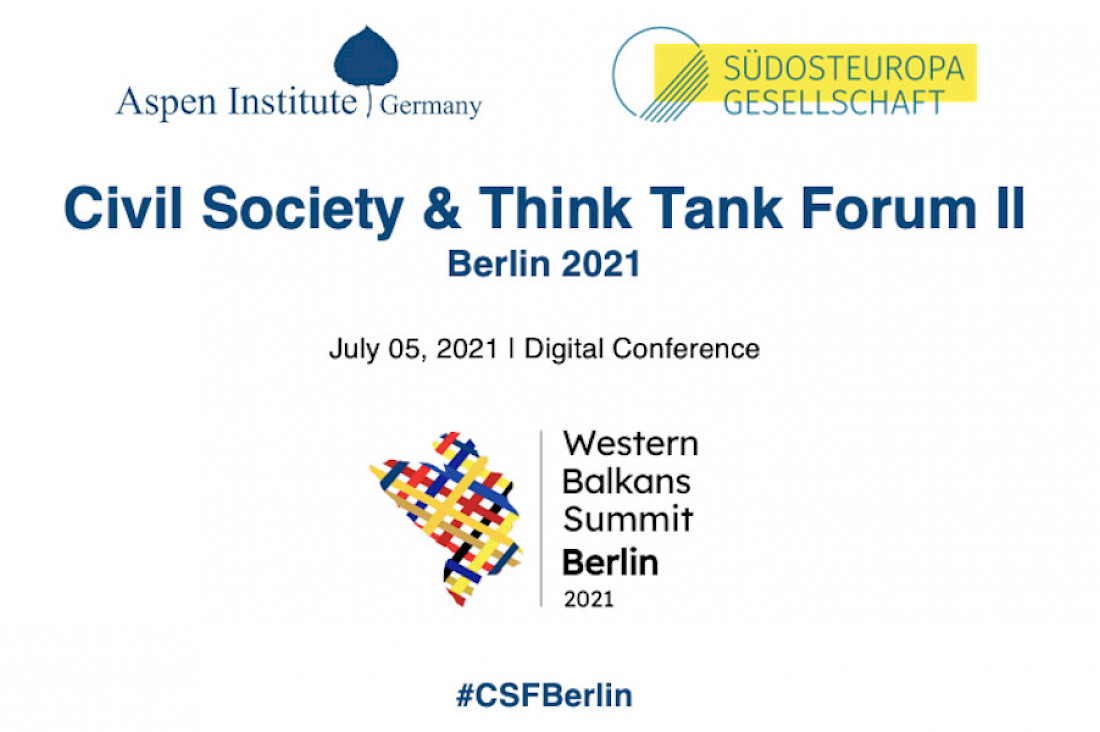Civil Society & Think Tank Forum II
July, 05, 2021
Welcoming Remarks
Manuel Sarrazin, MP, President of the Southeast Europe Association
Valeska Esch, Deputy Executive Director, Program Director Europe, Aspen Institute Germany
Video Message by the Federal Chancellor of the Federal Republic of Germany Angela Merkel
Panel Discussion I
Conditionality, the Reform Agenda, and the Future of the EU in the Western Balkans
Strengthening the rule of law, enhancing media freedom, and conducting democratization reforms are a substantial part of the EU reform agenda. The panelists will scrutinize the performance of regional governments in these areas, discuss the role of civil society actors, and assess the EU’s ability to support reform processes through conditionality mechanisms in light of growing geopolitical competition across the region.
Speaker:
Nikola Burazer, Programme Director, Center for Contemporary Politics
Arberesha Loxha, Executive Director at Group for Legal and Political Studies
Misha Popovikj, Good Governance Program Coordinator at Institute for Democracy Societas Civilis Skopje – IDSCS
State Secretary Kalinka Gaber, Secretariat for European Affairs
Maciej Popowski, Acting Director-General for Neighbourhood and Enlargement Negotiations, DG NEAR, European Commission
Moderation:
Vessela Tcherneva, Deputy Director Head, European Council on Foreign Relations, Sofia
Panel Discussion II
The Green Agenda and the Challenge of a Sustainable Transformation
Both the European Green Deal as well as the Green Agenda set an ambitious agenda in moving towards a more sustainable Europe. This panel will consider the cross-border nature of environmental issues relating to the problem of air pollution, the challenge of energy transtition as well as the protection of biodiversity and nature conservation. The panelists will highlight how Western Balkans governments, the EU, and civil society actors can contribute to the convergence of (environmental) standards and to the target of carbon-neutral economies within the EU and the region.
Speaker:
Nataša Crnković, Biodiversity and Protected Areas Program Coordinator, Center for Environment
Nihad Harbaš, Secretary General, Regional Center for Sustainable Energy Transition
Aleksandra Tomanić, Executive Director, European Fund for the Balkans
Sandra Dokić, Assistant Minister for Enviromental Protection
Majlinda Bregu, Secretary General, Regional Cooperation Council
Moderation:
Viola von Cramon-Taubadel, MEP, Greens – European Free Alliance
Panel Discussion III
Reconciliation, Social Dialog, and Regional Confidence Building
Reconciliation and regional confidence building continue to be challenges across the region and civil society organizations engaged in these issues continue to face obstacles and a lack of support. Building on the work of civil society representatives throughout the first forum, this panel will address how to improve and advance current reconciliation efforts and focus on the importance of strengthening social dialog between and within countries.
Speaker:
Branka Vierda, Program Coordinator, Justice Program, Reconciliation Program, Youth Initiative for Human Rights
Gordana Čomić, Minister for Human and Minority Rights and Social Dialogue
Donika Gërvalla-Schwarz, Minister of Foreign Affairs and Diaspora
Albert Hani, Secretary General, Regional Youth Cooperation
Moderation:
Florian Bieber, Professor, Center for Southeast European Studies, University of Graz, BiEPAG
Panel Discussion IV
Acceptance and Rights of Minorities in the Western Balkans
The acceptance and social inclusion of minorities in the region continue to pose a challenge. Based on the policy recommendations developed by civil society experts throughout the first Civil Society & Think Tank Forum, the panelists will discuss what Western Balkans governments, the regional civil society as well as the EU and its Member States can do to enhance social inclusion of Roma and other minorities, who currently face discrimination in the form of limited access to political representation, economic opportunities, education, healthcare, and other essential service.
Speaker:
Suad Skenderi, Programme Manager for Foreign and National Politics, Institute for Research and Policy Analysis - Romalitico
Sonja Licht, President, Belgrade Fund for Political Excellence
Emilija Redžepi, Third Deputy Prime Minister for Minority Issues and Human Rights
Frederic Jörgens, Deputy Head of Western Balkans Division, German Federal Foreign Office
Moderation:
Andréa Óhidy, Professor of Education, University of Education Freiburg
Panel Discussion V
Digitalization, Cyber Security, and Data Protection
The digitalization of public services in the Western Balkans is expected to be a major step towards increased transparency and curbing corruption. However, it also raises skepticism about adequate protection of data from private persons throughout the region. Cyber security is also a major concern since a lot of the material and communication, which used to take place in the office space, has been moved online due to the ongoing pandemic. Against this backdrop and that of regional deficiencies in the rule of law, this panel will focus on the major potentials and challenges that digitalization poses to the region
Speaker:
Danilo Krivokapić, Director, SHARE Foundation
Marko Čadež, President, Chamber of Commerce and Industry Serbia and Energy
Tamara Srzentić, Minister of Public Administration, Digital Society and Media
Moderation:
Anja Quiring, Regional Director Southeast Europe, German Eastern Business Association
Panel Discussion VI
Enhancing Integrity Compliance in Infrastructure Projects
Against the backdrop of an increased engagement of external actors, such as China’s 17+1 initiative, and taking into account the policy recommendations developed throughout the Civil Society & Think Tank Forum I, the panelists will discuss the Connectivity Agenda’s challenges and potentials as well as concrete proposals as to what Western Balkans governments, the EU, and civil society actors can do to enhance integrity compliance in infrastructure projects and achieve tangible results in the region
Speaker:
Ardian Hackaj, Director of Research and Coordinator of Tirana Connectivity Forum, Cooperation and Development Institute
Odeta Barbullushi, Advisor to the Prime Minister and National Coordinator for Regional Cooperation (tbc)
Bojan Marichikj, Minister of Justice (tbc)
Matteo Rivellini, Head of Division Croatia, Slovenia, and Western Balkans, European Investment Bank
Moderation:
Nora Hasani, Managing Director, German-Kosovar Business Association
Am 05.07.2021, 09:00 h
Venue: Berlin and Online

